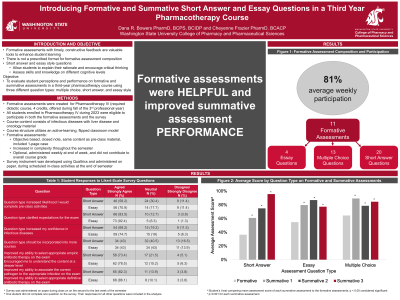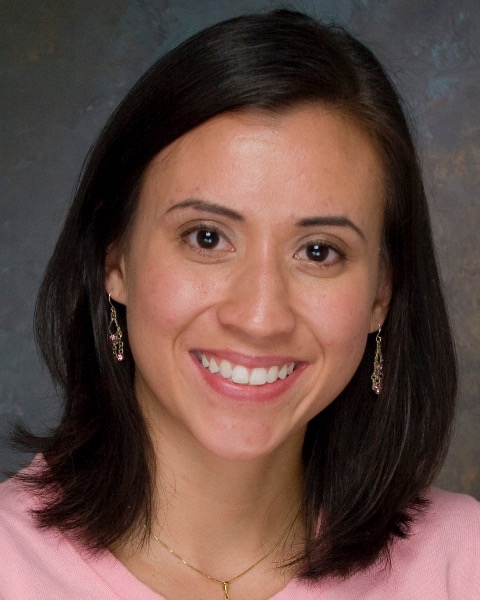Pharmacy Practice
(92) Introducing Formative and Summative Short Answer and Essay Questions in a Third Year Pharmacotherapy Course


Dana R. Bowers, Pharm.D., BCPS, BCIDP
Associate Professor
Washington State University
Yakima, Washington, United States- CF
Cheyenne Frazier, PharmD, BCACP
Associate Professor
Washington State University, Washington, United States
Primary Author(s)
Co-Author(s)
Objective : To evaluate student perceptions and performance on formative and summative assessments in a third-year pharmacotherapy course using three different question types: multiple choice, short answer, and essay style.
Methods: In 2023, short answer and essay style questions were implemented in a pharmacotherapy course in addition to standard multiple choice questions. Weekly formative assessments were administered to allow the students to practice their skills in a low-stakes environment and reinforce faculty expectations through essay question feedback. Assessment performance data for 3 summative examinations were analyzed. A survey instrument was developed to gauge student perceptions of the different question types on the formative and summative assessments.
Results: Eleven formative assessments were administered throughout the semester, including 4 essay, 13 multiple choice, and 20 short answer questions. An average of 81.1% (SD 11.3%) of students participated in the formative assessments over the course of the semester. Students performed better on the summative assessments compared to the formative assessments overall and by question type. Short answer questions had the largest difference in performance between the formative and the final summative assessment (59.4%, p< 0.001). Both essay and multiple choice also demonstrated improvement between the formative and final assessment (essay 22.8%, p< 0.001, multiple choice 20%, p< 0.001). There was a 94% response rate (79/84) on the survey. Students indicated that they strongly agreed or agreed that feedback on the in-class integrated case essay style questions improved examination performance (74.7%), clarified examination expectations (84.8%) and was useful to improve examination performance (78.5%).
Conclusions: Student performance improved between formative and summative assessments. The majority of students found formative assessment feedback helpful to clarify summative examination expectations, improve examination performance, and enhance clinical skills.
Methods: In 2023, short answer and essay style questions were implemented in a pharmacotherapy course in addition to standard multiple choice questions. Weekly formative assessments were administered to allow the students to practice their skills in a low-stakes environment and reinforce faculty expectations through essay question feedback. Assessment performance data for 3 summative examinations were analyzed. A survey instrument was developed to gauge student perceptions of the different question types on the formative and summative assessments.
Results: Eleven formative assessments were administered throughout the semester, including 4 essay, 13 multiple choice, and 20 short answer questions. An average of 81.1% (SD 11.3%) of students participated in the formative assessments over the course of the semester. Students performed better on the summative assessments compared to the formative assessments overall and by question type. Short answer questions had the largest difference in performance between the formative and the final summative assessment (59.4%, p< 0.001). Both essay and multiple choice also demonstrated improvement between the formative and final assessment (essay 22.8%, p< 0.001, multiple choice 20%, p< 0.001). There was a 94% response rate (79/84) on the survey. Students indicated that they strongly agreed or agreed that feedback on the in-class integrated case essay style questions improved examination performance (74.7%), clarified examination expectations (84.8%) and was useful to improve examination performance (78.5%).
Conclusions: Student performance improved between formative and summative assessments. The majority of students found formative assessment feedback helpful to clarify summative examination expectations, improve examination performance, and enhance clinical skills.

.png)